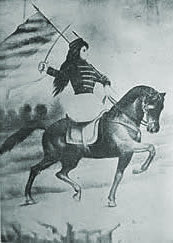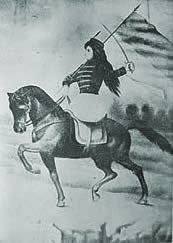
|
Women and Independence in Latin America An exploration of women's involvement in the Latin American Wars of Independence |

|

|
Women and Independence in Latin America An exploration of women's involvement in the Latin American Wars of Independence |

|
Gender:Female
Ethnic origen: Unknown
Events:
| 1765 | - | La Guaira | - | Not applicable | - | She was born 18 October 1765. |
| 1783 | - | La Guaira | - | Unknown | - | She married José María España on 27 July 1783. |
| 1799 | - | La Guaira | - | Patriot | - | She was accused of having encouraged a slave revolt. |
| 1799 | - | Caracas | - | Unknown | - | Her husband was executed on 8 May 1797. |
| 1800-1808 | - | Caracas | - | Unknown | - | She was imprisoned in the Casa de Misericordia, Caracas between 1800 and 1808. |
| 1808? | - | Cumaná | - | Unknown | - | She possibly died in 1808 after spending 8 years 10 months in prison. |
| 1808 | - | Cumaná | - | Unknown | - | She was sent here after her imprisonment in Caracas. |
| 1808 | - | Caracas | - | Unknown | - | On 13 June 1808, she wrote from prison to ask permission for her sons to complete their studies in Caracas. |
Connections:
Gual-España revoltBiography:
She was born in La Guaira, Venezuela, on 18 October 1765. She married José María España in 1783, they had 8 children. She helped in the struggle for independence from the beginning. She copied out documents of the revolution and made the first banners and the flag. In May 1799 she was questioned by the authorities following an accusation made by one of her slaves, Rafael España, who confessed that she had induced slaves on her hacienda and on others in the vicinity to rebel against the authorities in La Guaira. She calmly answered that she lived alone with her children and her Indian servant, María Josefa Rufina; she didn't know where her husband was, nor the other rebels, Manuel Gual and Domingo Sánchez. She said that she hadn't spoken to Rafael España for three months. A few days later, on 8 May 1797, José María España's body was left hanging; Sánchez was arrested. She was taken to Caracas on 29 April 1799 and on 19 February 1800 was sentenced to 8 years imprisonment in the Casa de Misericordia. On 13 June 1808, she wrote to the Governor asking that her sons be allowed to finish their studies in philosophy at the University of Caracas. On 10 July, permission was denied, and they were ordered to go with her to Cumaná, where she would live out her days. (N.A., Heroínas, 15-18)
The wife of José María España, leader of the Gual-España revolt, 1797, she hid him from the authorities and encouraged a slave revolt. She distributed revolutionary literature in Caracas with Isabel Gómez. She was imprisoned and exiled, other female relatives of the men involved were deported to Spain. (Cherpak, 220)
She was heavily involved in the plot. She persuaded José, one of her slaves, to incite an uprising among the slaves in Naguatá, and to unite with others and attack Caracas. Her servant Josefa Rufina Acosta delivered messages about the conspiracy. Her sister-in-law, Joaquina España was also involved. She was imprisoned along with Acosta in 1799. On 10 February 1800 she was sentenced to 8 years in prison. (Monsalve, 18-20)
She possibly died in 1808 after spending 8 years 10 months in prison.
She was sentenced to eight years seclusion for her hiding her husband from the authorities. (Díaz, 55)
References:
Lavrin, Asunción (editor). (1978) Latin American Women: Historical Perspectives; Contributions in Women's Studies, No.3.
Díaz, Arlene J. (2004) Female Citizens, Patriarchs and the Law in Venezuela, 1796-1904
Knaster, Meri (1977) Women in Spanish America: An Annotated Bibliography from Pre-Conquest to Contemporary Times
Monsalve, José D (1926) Mujeres de la independencia
N.A. (1964) Heroínas venezolanas